Middling Planeswalkers deny that they make mistakes. Adepts acknowledge their errors and seek techniques to avoid each Mental Misstep. In the first Foolproof Magic, we learned how to always remember if we've played our land for the turn. In “Foolproof Magic 2,” we studied the proper care and handling of morphs, along with managing complex board states.
In this third booster shot of blunder prevention, we'll bring clarity to our board states with creature placement. First, though, we'll discuss a trick used by Pascal Maynard in Grand Prix Omaha. Look closely at his grip on the right side of the picture. Try to guess why he's holding the cards in his hand upside down.
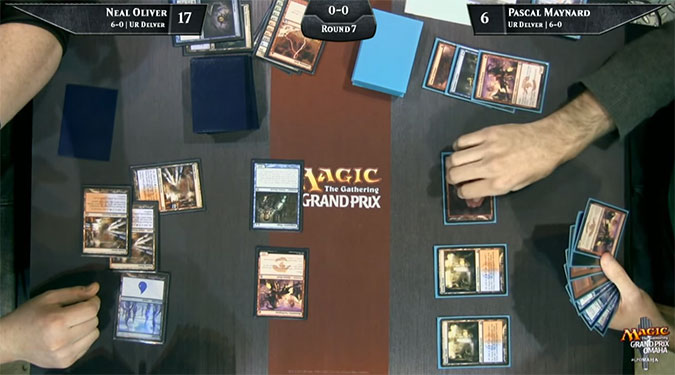
His opponent, Grand Prix Champion Neal Oliver, has just resolved a Gitaxian Probe and seen all of Pascal's cards. Pascal turns them upside down so he can know which his dread foe knows about and which might yet surprise him. As Pascal draws additional cards, he puts them right side up in his hand.
The Pascal Method will stop me from accidentally tipping my hand. Even when I know which cards my opponent wrote down from his or her Thoughtseize, I tend to discount which lands he or she has seen. By playing a new land, I'm giving him or her unearned information on my draws.
Problem: Information Bleed
Solution: The Pascal Method
This assumes that the opponent will remember the cards he or she has seen in our hands. We're used to taking notes on cards revealed in Constructed, such as from a Courser of Kruphix. The habit can also help us in Limited. If my opponent has played a morph in games one or two, I want to be aware it might leap from that glowing gold fireball in game three. There's only one difficulty, and that resides in my squishy brain. What was that morph again?
Problem: Imperfect Memory
Solution: Writing Cards Down
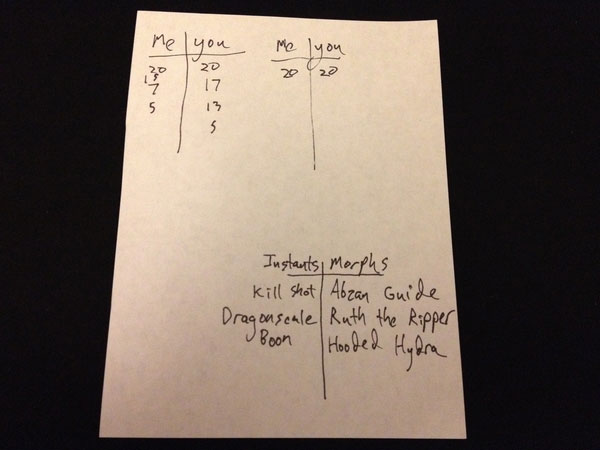
Being blown out by Dragonscale Boon in one game is bad enough. After an opponent plays it against me, I want to give the possibility of an encore additional weight. That said, I also wish to stay flexible in my understanding of which tricks he or she could have. I never presume I have perfect information of what my opponent could play from game to game. I prefer to side out known tricks if I have an alternative.
I find it most useful to write down my opponent's instants and morphs, as those throw the biggest wrenches in my decision points. However, you can write down every card the opponent plays as a mental exercise in Limited. It gives a greater appreciation for the nature of the enemy and may help sideboarding. For example, say my foe doesn't play anything on turns two or three and then continues to play 2-mana-cost creatures on turns four through nine. If I'd written all the bears down, I'd be warned that I face a fast deck that had merely stumbled in the first game.
Games of Limited are exciting in part because the creature combat can be more complex than Constructed. The lack of sweepers results in massive armies on the battlefield. Analyzing the mayhem can bewilder new players, and even Magic veterans can struggle to make decisions in a timely fashion.
Problem: Calculating Army Damage
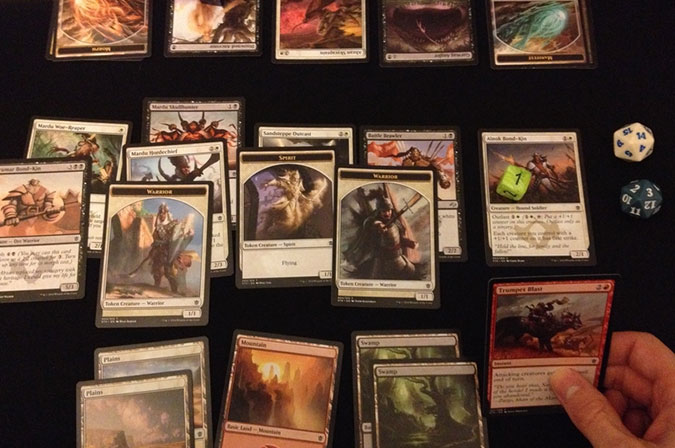
If I swing and Trumpet Blast, will I kill my opponent or die on the crack-back? My foe has five blockers and has been representing an instant like Kill Shot. If my six creatures with the greatest power are stymied, will enough damage remain to deal the final 14 points and sound my victory?
Thinking too long in scenarios like this will eat away at the clock and make my opponent cautious. I need to know if I can win as soon as I draw my card. Thinking about blockers and attackers on my opponent's turn will help. Perhaps I can find another way to simplify the problem.
Solution: Arranging Creatures by Power
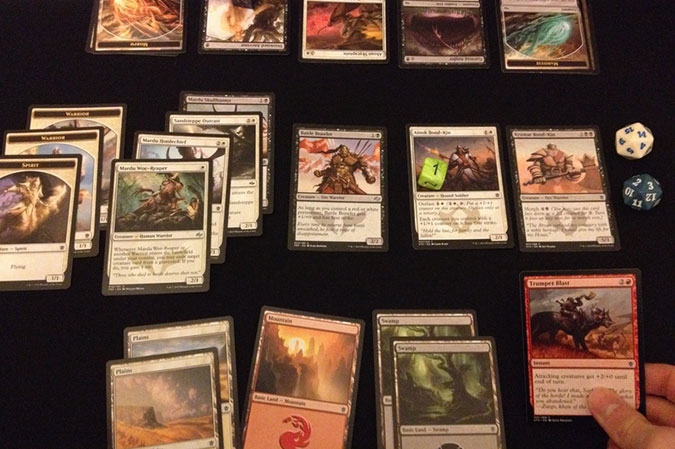
Now I can see that if my six most powerful creatures are blocked or neutralized, four will connect. Trumpet Blast will deal 2 × 4 by itself, putting my opponent at 14 - 8 = 6. My 1-power creatures will deal 1 × 3, plus 2 × 1 from my unblocked 2-power creature. Adding that together, I see I'd leave my opponent on 1 life. If I had messed up my calculation, he'd be alive, and I'd be tapped out and dead.
Now, if my opponent doesn't actually have a Kill Shot, an additional 2-power creature will connect for lethal. It could be that the correct play is to risk it and attack—or to attack and brutalize my opponent's board. Those are the higher-level decisions I want to be thinking about rather than wasting time crunching numbers.
In the thick of combat, it's easy to forget about an effect like Crippling Chill. A turn cycle may have gone by, and there's nothing more natural in a game of Magic than untapping all permanents together at the start of the turn, even if it's illegal.
Problem: Forgetting the Icing
If someone casts Crippling Chill, I'll place a counter beside the creature. During the untap step, I'll remove that counter and restate that the creature is shaking off the chills. If it's my own creature, my removing the counter instead of untapping it is a natural enough action to remember.
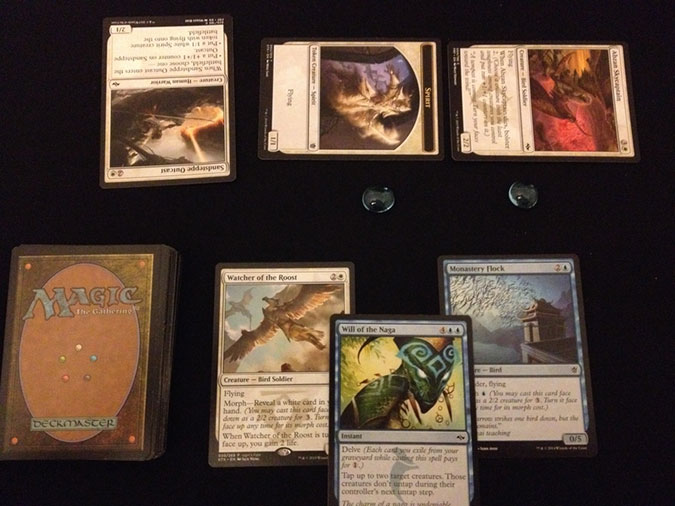
In a past Foolproof Magic, I presented methods to remember triggers during the upkeep (Slaughter Pact) or when casting spells (Young Pyromancer). I forgot to leave myself a reminder to discuss that most fraught of phases: the end of the turn.
Bonus Problem: Forgetting End-of-Turn Plays
Pro streamer and Magic try-hard Day[9] has told some great stories about his woes forgetting to ping his opponent before untapping. I recommend placing a counter near any tapped lands. Before I untap them at the start of my turn, I'll see the counter and remember to give my opponent the just-deserved ping.
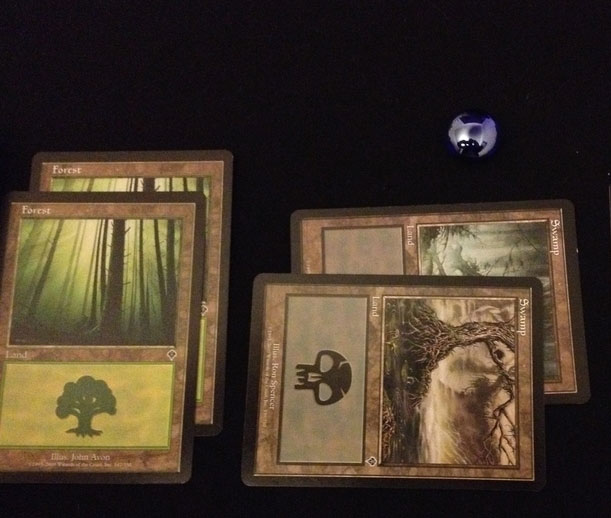
Solution: Reminder Counter
These techniques won't solve the hardest challenges of playing Magic, but they'll keep us from tripping over the most tilting ones. Leave a comment about any other techniques you find helpful. Or is there a troublesome error that you'd like vanquished in the next Foolproof Magic?























